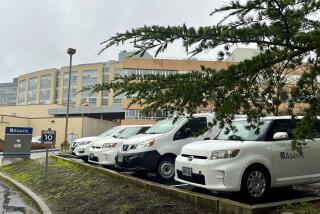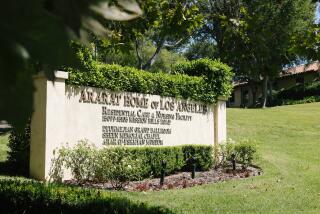Mishandling of Radioactive Waste Alleged : Medicine: Officials are investigating whether hazardous material posed a health risk at a Lancaster hospital.
LANCASTER — State and county officials said Friday that they are investigating allegations that staff members mishandled radioactive waste in patients’ rooms at the county-operated High Desert Hospital in Lancaster.
A hospital spokesman acknowledged that handling errors occurred, but said the facility had begun correcting the problem even before a county health investigator arrived Tuesday.
Jerry M. Harris, associate administrator of the 170-bed hospital, also said any improper handling of radioactive materials had posed no health hazards. “There was no problem in terms of safety to patients or employees,” he said.
The problem arose in the past month when four patients were given radioactive iodine capsules to swallow as treatment for thyroid disorders. Some hospital linens, patient gowns, eating utensils and other supplies they used, tainted by radiation, were not taken to a protected waste-disposal area behind the hospital, as is required by state regulation, Harris said.
“That material has to be put in a containment area and stored long enough for the level of radiation to go down,” a period lasting up to 80 days, he said. “Then it can be shipped to a hazardous waste disposal site.”
In one of the recent cases, radioactive materials were mixed with other medical waste and picked up by a disposal company, he said. During processing by the company, a Geiger counter picked up radioactivity, and the company asked the hospital to retrieve the material and put it in the containment area, Harris said.
“It basically was a breakdown in communication. We have policies and procedures” for handling radioactive materials that were not followed, he said.
He said staff members may have forgotten the rules because the thyroid radiation treatment had not been administered at the hospital for several years, “then all of a sudden we had four cases within about a month.”
Harris said hospital employees will receive more training to prevent a recurrence. “If we make a mistake, we want to correct it, and that’s what we’re doing,” he said.
Physician Claudette Robbins, the hospital’s chief radiologist, said she believed the incidents had been “blown out of proportion” by hospital employees who were not working directly with the patients receiving radiation treatment.
“We’re doing things properly in such a way as there are no safety issues,” Robbins said.
Barbara Hamrick, a county health physicist who is investigating the radiation complaint, would not comment Friday on whether the hospital’s handling posed any health risks, and referred all questions to her supervisor at the Los Angeles County Office of Radiation Management, which was closed Friday.
The national Joint Commission on Accreditation of Healthcare Organizations also is looking into the allegations of mishandling of radioactive materials at High Desert, said Suzanne Gylfe, a commission spokeswoman.
The investigations began when an anonymous caller recently complained to the state Department of Health Services.
Kim Wong, chief of compliance for the department’s Southern California Radiological Health Branch, said he referred the matter to county investigators because they have jurisdiction over the High Desert. He said the results of the county’s probe will be sent to his supervisors in Sacramento.
Wong said people who take radioactive iodine on an outpatient basis are usually urged to stay away from pregnant women and small children for three days for safety reasons. But he said such patients transmit only a small, relatively harmless amount of radiation to fabrics they wear and utensils they use.
“If you’re exposed to contaminated linen or utensils, you’re not apt to have any kind of a health threat,” Wong said.
Nevertheless, he said, hospitals are required to follow strict rules in handling radioactive material in order to keep exposure levels as low as possible.
More to Read
Sign up for Essential California
The most important California stories and recommendations in your inbox every morning.
You may occasionally receive promotional content from the Los Angeles Times.










